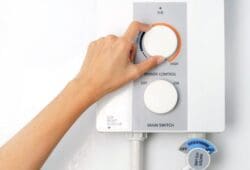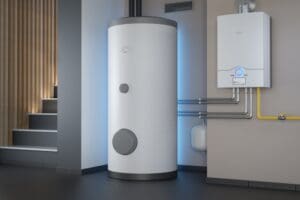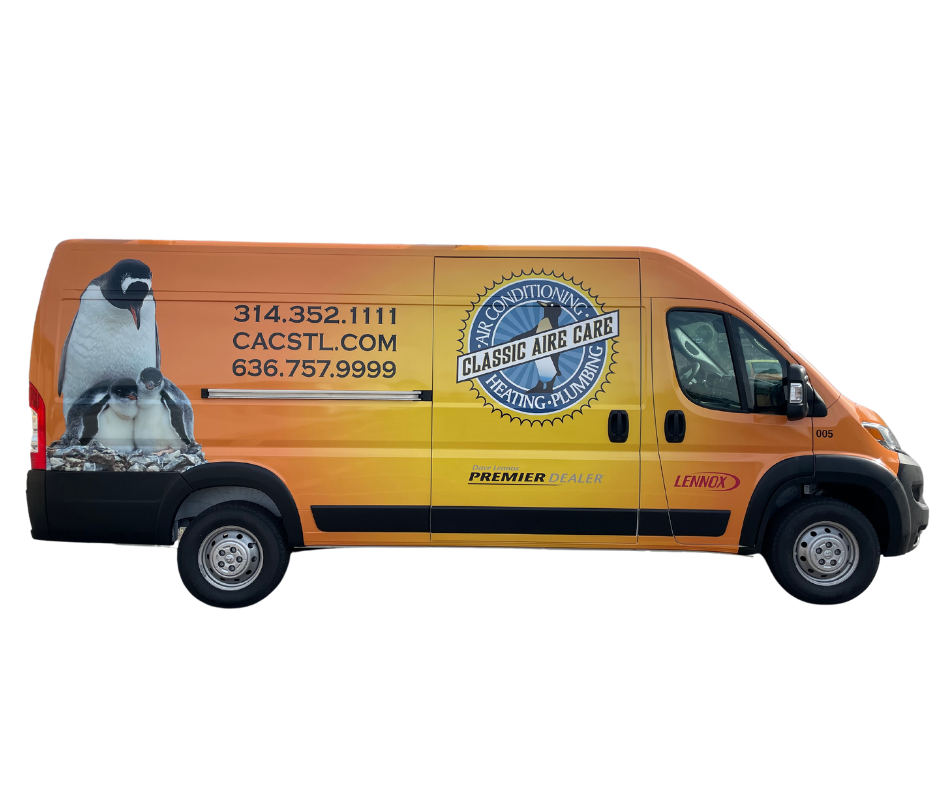Tankless Water Heaters vs Tank: Which Is Right for Your Home?

If you’re looking for a water heater for your home in St Louis, MO, it’s essential to know which one is right for you—at Classic Air Care, we’re here to help. Join us in this blog as we go over the pros and cons of storage tank water heaters versus tankless water heaters.
Have Water Heater Questions? Call Us Today
Storage Tank Water Heaters
A storage tank water heater provides hot water to a home or business and is powered by natural gas, propane, or electricity. They can come in different styles depending on the size of your home and how many people live in it. An average tank water heater is about 5 feet tall and 2 feet wide, holding up to 50 gallons of water. These tanks are usually located in your garage, basement, or closet.
How They Work
When water enters the tank, it is heated with a heat exchanger unit and is stored until it’s needed. The tank is well insulated and goes through heating sequences to make sure the water holds its desired temperature. There should be an outlet pipe at the top of your tank water heater that will direct hot water to each faucet or water source in your home.
Advantages of a Tank Water Heater
Reliability and familiarity for many homeowners.
You probably have a tank water heater in your home right now and are just now learning that tankless water heaters exist. This is because tank heaters have been around for decades and many homeowners are comfortable with how it functions.
Lower initial cost compared to tankless options.
Tank water heaters are usually much cheaper to install than tankless models. Tank water heaters have a simple installation process that doesn’t require any outside plumbing or electrical work.
Easy installation and maintenance.
Setting up a tank water heater is easier than installing tankless heaters—the process involves connecting the unit to an energy supply and water supply, and that’s it.
Disadvantages of Tank Water Heaters
Limited hot water capacity, especially during high-demand periods.
The amount of hot water in your tank is what you have readily available, but that’s it. When you use up all the hot water in your tank, you will have to wait for it to refill and start the heating process again.
Energy inefficiency due to standby heat loss.
Tank water heaters are continuously on and running to ensure hot water in the tank. This uses a lot of energy and increases your monthly energy bill compared to tankless water heaters that only heat water when you need it.
Lifespan may be shorter compared to tankless models.
A tank water heater should last you about 10-15 years, whereas a tankless water heater has a lifespan of 20 years or more.
Tankless Water Heaters
A tankless water heater operates similarly to water heaters with tanks: they both work to provide the home or building with hot water. A tankless water heater is different because well, it has no tank to hold hot water. Even though these are less common in households, they offer amazing benefits if you’re looking to upgrade, replace, or install a new water heater.
How They Work
When you turn on a faucet or hot water source in your home, water will pass through your tankless water heater, and heats it with a heat exchanger unit. Once water is heated, it will deliver the hot water to whatever faucet or water source you turned on—it’s a pretty simple process.
Advantages of Tankless Water Heaters
Endless hot water supply on-demand.
Without a reservoir or tank to hold hot water in, a tankless water heater provides hot water the second you turn on your faucet.
Energy efficiency and lower operating costs.

An on-demand water heater allows you to save energy and money. Since a tankless water heater only operates and heats water when a faucet or water source is turned on, it saves energy while dormant, lowering your utility
bill.
Space-saving design and longer lifespan compared to tank models.
Without the bulkiness of a tank, a tankless water heater model can save space in your home and be installed virtually anywhere, even in areas with limited space.
Disadvantages of Tankless Water Heaters
Complex installation and higher upfront costs.
Installing a tankless water heater is more complex and may even require a water heater expansion tank to balance the pressure. Tankless water heaters may also need modifications to existing plumbing and electrical systems, so the upfront installation cost is usually more expensive than tank water heaters.
Flow rate limitations may not meet the demands of larger households.
Since tankless water heaters produce hot water on demand, if multiple faucets or hot water sources are turned on in the home, then the heater may not be able to produce enough hot water for each source. For example, if you have a large home and two people need to take a shower at the same time, one of them may have hotter water than the other.
Making the Decision: Choosing the Best Water Heater for Your Home
When it comes to selecting the right water heater for your home, several factors should be carefully weighed. Here’s a breakdown to help guide your decision:

Considerations for Storage Tank Water Heaters
Household Size and Usage: Consider the number of individuals in your household and their hot water needs. Larger families may require a larger capacity tank to ensure there is enough stored hot water to go around.
Budget Constraints and Initial Investment: Evaluate your budget when looking at the initial cost of installing a storage-tank water heater. While these models tend to have lower upfront costs, they may have
higher operating expenses over time.
Space Availability for Installation: If you don’t have a water heater, and want a tank model, you need to make sure you have a place to put it. These units are large in size and require enough space for them to ventilate and work properly.
What To Consider for Tankless Water Heaters
Increased Energy Efficiency: Tankless water heaters are known for their energy efficiency, as they heat water on demand rather than storing it in a tank. This can lead to long-term savings on utility bills.
Continuous Hot Water Supply: If you prioritize a continuous supply of hot water, a tankless water heater may be the ideal choice. These units heat water instantaneously, ensuring hot water is available whenever needed.
Installation Investment & Upfront Costs: Tankless water heaters typically have higher initial costs compared to storage tank models, but they offer potential savings over time. Consider your willingness to invest upfront for future benefits, such as reduced energy consumption and lower utility bills.
Water Heater Repair & Installation in St Louis, MO
Now that you know the pros and cons of both tank and tankless water heaters, you’re able to make an informed decision about which one is right for you. At Classic Aire Care in St. Louis, MO, our professionals offer top-tier water heater installation and repair services. Whether you’re considering upgrading to a tankless system or need maintenance for your existing unit, our experienced technicians are here to assist you.
Contact us today to schedule a consultation and ensure your home’s water heating needs are met efficiently and effectively.
let’s get started
Let's Get Started


Save on Service & Enjoy Peace of Mind
Become a Planned Maintenance Agreement Customer
- Priority customer status
- Discounts on repair services
- Comprehensive maintenance & tune-ups
- No overtime charges
- Extended equipment life





